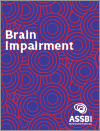Maladaptive illness perceptions are known to contribute to the development of persistent symptoms following mild traumatic brain injury or concussion. This study showed that specific perceptions (e.g. expecting a long duration of symptoms, lack of understanding the illness, emotional impact of the illness) predict the severity of post-concussive symptoms and anxiety and depression symptoms in the chronic phase (>3 months–several years) post-mild traumatic brain injury. These findings underline the importance of psychoeducation and psychotherapeutic interventions in this population.

Brain Impairment
Volume 26 Number 2 2025
Youth with a traumatic brain injury are at increased risk of externalising behaviours and disorders if untreated, negatively impacting their quality of life. Yet over 50% of these youth do not receive needed psychological services, and evidence-based treatments to reduce externalising behaviours are unknown. This review outlines evidence-based recommendations that may (a) help clinicians make evidence-based treatment decisions, (b) outline gaps for future research and (c) provide promise for a population with an increased risk of aggression and antisocial behaviour if untreated.
Communication is a key point in the preservation of autonomy of locked-in syndrome persons. Only half of locked-in syndrome persons benefited from communication skills evaluation. Electronic communication tools enhance an LIS person’s social participation.
Despite their complex health needs, there are limited targeted resources to assist people with traumatic brain injury to age well. This study used co-design and co-production methods within a five-stage design-thinking process to develop a new resource called ‘Tools for ageing well with traumatic brain injury’. This resource will help people with brain injury and their families/carers to proactively plan for ageing well with traumatic brain injury. Image credit Ingrid Hopper using adapted photograph by Roman Samborskyi/Shutterstock.com.
This article belongs to the collection: Collaboration, Co-production, & Co-design: Moving Ahead in Brain Impairment.
IB24125 Abstract | IB24125 Full Text | IB24125PDF (2.1 MB) | IB24125Supplementary Material (4.6 MB) Open Access Article
We used a theory-informed approach to explore problems experienced by healthcare professionals in supporting adults with acquired brain injury to transition from an inpatient rehabilitation setting to home. We found that healthcare professionals want clearer discharge pathways and checklists, clearer objectives in discharge planning meetings, and increased involvement of family and nursing staff to enable optimal discharge outcomes with individuals with acquired brain injury.
IB24029 Abstract | IB24029 Full Text | IB24029PDF (876 KB) | IB24029Supplementary Material (505 KB) Open Access Article
Brain injury rehabilitation services have historically been evaluated and designed by healthcare administrators, executives and managers. Co-design and consumer and clinician evaluation is important to identify strategic priorities of health services into the future. The purpose of this study was to identify and prioritise features of a brain injury rehabilitation service that are important to health professionals and consumers (clients and family) in a regional area.
The National Disability Insurance Scheme plays a critical role in the lives of Australians with disability, aiming to enhance choice, control, and self-determination. This study found that while participants valued the opportunities enabled by their National Disability Insurance Scheme funding, they often felt frustrated by the system’s complexities and inequities, leading to a loss of trust. The importance of supportive interpersonal relationships, or ‘allies’, to successfully navigate the National Disability Insurance Scheme was also emphasised.
IB24103 Abstract | IB24103 Full Text | IB24103PDF (540 KB) Open Access Article
Improved access to assessment of mild cognitive impairment is crucial to monitoring and care. This study used a randomised cross-over design to assess the practicality, acceptability, and adaptation of a telehealth-based screening battery among 43 volunteers aged 50+ years who completed assessments in-person and via videoconference. Findings indicate the telehealth adaptation to be practical and acceptable to older adults, with scores reliable across assessment modes.
IB24114 Abstract | IB24114 Full Text | IB24114 Full Text | IB24114PDF (377 KB) | IB24114Supplementary Material (171 KB) Open Access Article





